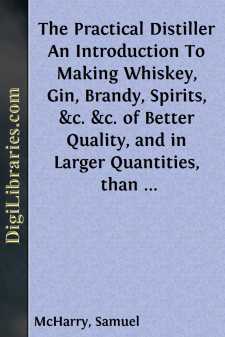Categories
- Antiques & Collectibles 13
- Architecture 36
- Art 48
- Bibles 22
- Biography & Autobiography 813
- Body, Mind & Spirit 142
- Business & Economics 28
- Children's Books 17
- Children's Fiction 14
- Computers 4
- Cooking 94
- Crafts & Hobbies 4
- Drama 346
- Education 46
- Family & Relationships 57
- Fiction 11829
- Games 19
- Gardening 17
- Health & Fitness 34
- History 1377
- House & Home 1
- Humor 147
- Juvenile Fiction 1873
- Juvenile Nonfiction 202
- Language Arts & Disciplines 88
- Law 16
- Literary Collections 686
- Literary Criticism 179
- Mathematics 13
- Medical 41
- Music 40
- Nature 179
- Non-Classifiable 1768
- Performing Arts 7
- Periodicals 1453
- Philosophy 64
- Photography 2
- Poetry 896
- Political Science 203
- Psychology 42
- Reference 154
- Religion 513
- Science 126
- Self-Help 84
- Social Science 81
- Sports & Recreation 34
- Study Aids 3
- Technology & Engineering 59
- Transportation 23
- Travel 463
- True Crime 29
The Practical Distiller An Introduction To Making Whiskey, Gin, Brandy, Spirits, &c. &c. of Better Quality, and in Larger Quantities, than Produced by the Present Mode of Distilling, from the Produce of the United States
by: Samuel McHarry
Categories:
Description:
Excerpt
When I first entered on the business of Distilling, I was totally unacquainted with it. I was even so ignorant of the process, as not to know that fermentation was necessary, in producing spirits from grain. I had no idea that fire being put under a still, which, when hot enough, would raise a vapour; or that vapour when raised, could be condensed by a worm or tube passing through water into a liquid state. In short, my impressions were, that chop-rye mixed with water in a hogshead, and let stand for two or three days; and then put into a still, and fire being put under her, would produce the spirit by boiling up into the worm, and to pass through the water in order to cool it, and render it palatable for immediate use—and was certain the whole art and mystery could be learned in two or three weeks, or months at farthest, as I had frequently met with persons who professed a knowledge of the business, which they had acquired in two or three months, and tho' those men were esteemed distillers, and in possession of all the necessary art, in this very abstruse science; I soon found them to be ignorant blockheads, without natural genius, and often, without principle.
Thus benighted, and with only the above light and knowledge, I entered into the dark, mysterious and abstruse science of distilling, a business professed to be perfectly understood by many, but in fact not sufficiently understood by any. For it presents a field for the learned, and man of science, for contemplation—that by a judicious and systematic appropriation and exercise of certain elements, valuable and salutary spirits and beverages may be produced in great perfection, and at a small expense, and little inconvenience, on almost every farm in our country.
The professed chymist, and profound theorist may smile at my ideas, but should any one of them ever venture to soil a finger in the practical part of distilling, I venture to say, he would find more difficulty in producing good yeast, than in the process of creating oxygen or hydrogen gas. Scientific men generally look down on us, and that is principally owing to the circumstance of so many knaves, blockheads and conceited characters being engaged in the business.—If then, the subject could be improved, I fancy our country would yield all the necessary liquors, and in a state of perfection, to gratify the opulent, and please the epicure.
I had no difficulty in finding out a reputed great distiller, whose directions I followed in procuring every necessary ingredient and material for distilling, &c. He was industrious and attentive, and produced tolerable yield, but I soon found the quantity of the runs to vary, and the yield scarcely two days alike. I enquired into the cause, of him, but his answers were, he could not tell; I also enquired of other distillers, and could procure no more satisfactory answer—some attributed it to the water, others to witchcraft, &c. &c.
I found them all ignorant—I was equally so, and wandered in the dark; but having commenced the business, I determined to have light on the subject; I thought there must be books containing instructions, but to my surprise, after a diligent search of all the book-stores and catalogues in Pennsylvania, I found there was no American work extant, treating on this science—and those of foreign production, so at variance with our habits, customs, and mode of economy, that I was compelled to abandon all hope of scientific or systematic aid, and move on under the instructions of those distillers of our neighborhood, who were little better informed than myself, but who cheerfully informed me of their experiments, and the results, and freely communicated their opinions and obligingly gave me their receipts. In the course of my progress, I purchased many receipts, and hesitated not to procure information of all who appeared to possess it, and sometimes at a heavy expense, and duly noted down all such discoveries and communications—made my experiments from time to time, and in various seasons, carefully noting down the results. Having made the business my constant and only study, carefully attending to the important branch of making yeast, and studying the cause and progress of fermentation, proceeding with numerous experiments, and always studying to discover the cause of every failure, or change, or difference in the yield....


